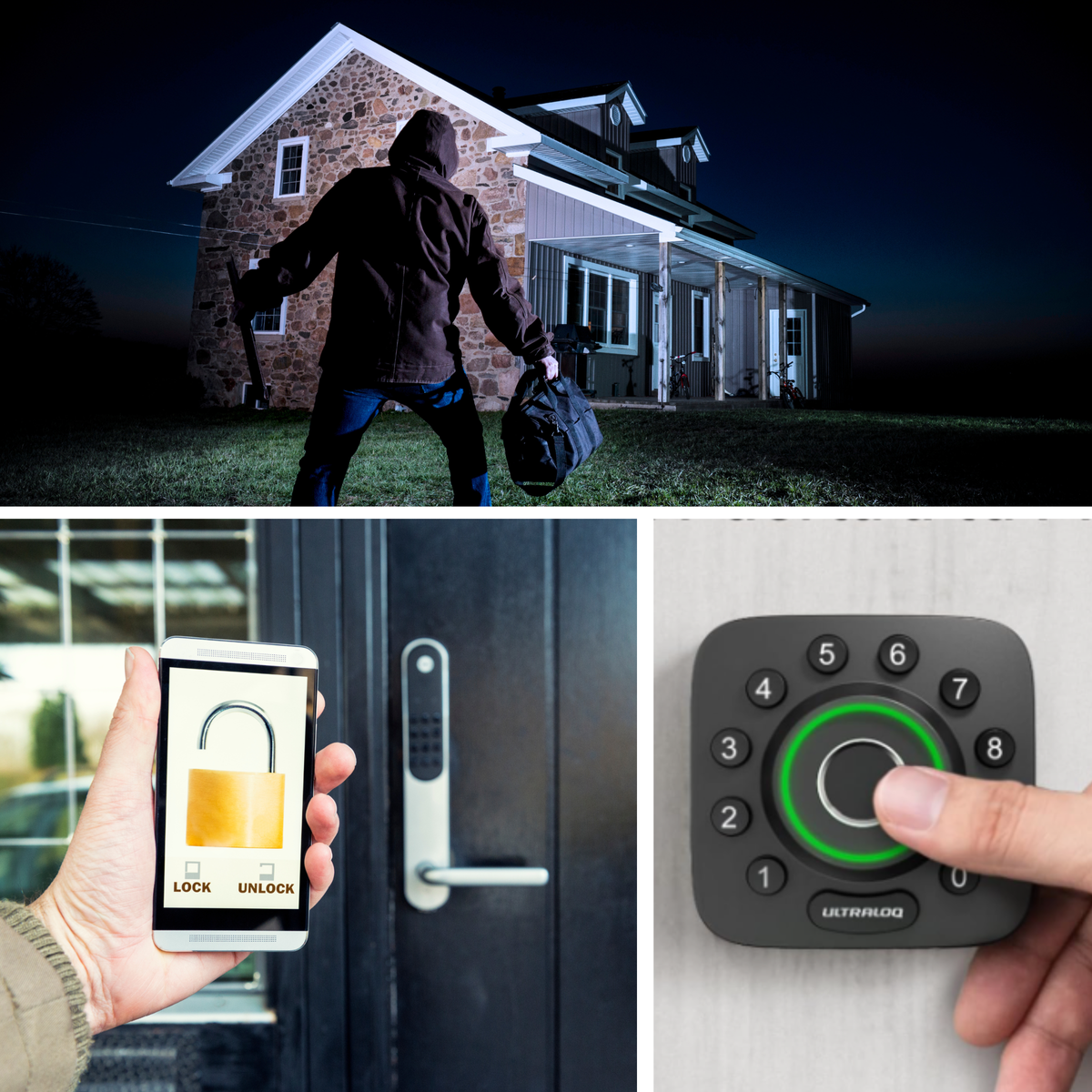Key Takeaways:
- Smart locks offer advanced security features that can deter burglars by making unauthorized access more difficult.
- Integrating smart locks with other smart home devices and security systems can provide a comprehensive approach to home security.
- While smart locks add a layer of protection, they should be part of a broader security strategy that includes physical and behavioral measures.
Home security is a primary concern for homeowners worldwide. With the advent of smart technology, traditional home security measures are being supplemented or replaced by more advanced systems. Among these, smart door locks have emerged as a popular option for those looking to upgrade their home's security. But the question remains: do smart locks deter burglars effectively? This article delves into the capabilities of smart locks and their role in preventing home burglaries.

The Evolution of Locks and Home Security
The history of locks is as old as civilization itself, with the earliest known locks dating back to ancient Egypt. Over the centuries, locks have evolved from simple wooden pin locks to the sophisticated electronic and smart locks we see today. Smart door locks, in particular, have brought a new level of convenience and security to homeowners. With features like pin authentication, fingerprint recognition, and the ability to lock and unlock doors remotely via a smartphone app, these locks are designed to provide enhanced security and prevent unauthorized access.
How Smart Locks Work to Secure Your Home
Smart locks function by connecting to your home's internet network, allowing you to control them through a smartphone app or web interface. They often come with several devices that work together to secure your door, such as keypads for pin authentication or biometric scanners for fingerprint recognition. These features make it significantly more difficult for potential burglars to gain entry, as they cannot simply pick a lock or find a spare key hidden outside.
The Deterrent Effect of Advanced Security Features
One of the most effective ways smart locks deter burglars is through their advanced security features. Unlike traditional key locks, smart locks often have built-in alarms that sound when someone attempts to force the door or tamper with the lock. Additionally, many smart locks have the ability to send alerts to your smartphone if an unauthorized access attempt is detected, allowing you to respond quickly to potential threats.

Combining Smart Locks with Other Security Measures
While smart locks are a powerful tool in preventing break-ins, they are most effective when used as part of a comprehensive home security system. This includes the integration of security cameras, alarm systems, and other smart home devices. For example, a camera placed above the front door can provide visual verification of visitors, and an alarm system can alert homeowners and authorities in case of a break-in.
The Psychological Impact on Burglars
Burglars are often opportunistic and look for the path of least resistance. A home equipped with a smart door lock, visible security cameras, and other security systems presents a much less appealing target. The presence of these technologies can psychologically deter home intruders, as they are aware that these homes are better secured and the risk of getting caught is higher.
Are Smart Locks Impenetrable?
No security measure is foolproof, and smart locks are no exception. While they offer enhanced security features, they are still susceptible to sophisticated hacking methods. However, manufacturers are continually improving the technology to prevent such vulnerabilities. It's also important to keep the lock's firmware updated and to use strong, unique passwords for your home network to reduce the risk of cyber attacks.

Smart Lock Integration with Home Automation Systems
Smart locks are becoming an integral part of comprehensive home automation systems, allowing homeowners to control access to their house with the touch of a button. By integrating smart locks into your home's automation system, you can lock or unlock doors remotely, ensuring that you never have to worry about forgetting to secure your home. This convenience extends to your garage door as well, which is often an overlooked entry point for most burglars. With the ability to monitor and control your garage door from anywhere, you can prevent unauthorized access and enhance your home's overall security.
Moreover, the integration of smart locks with home automation systems often includes features such as built-in alarms and real-time alerts, which notify homeowners of any attempts at lock picking or forced entry. This proactive approach to security not only helps to prevent home burglaries but also provides a sense of reassurance. In Australia, where the adoption of smart home technology is on the rise, homeowners are increasingly purchasing smart locks that seamlessly blend with their existing home automation setups, creating a fortified, yet user-friendly, security ecosystem.
Enhancing Window Security with Smart Lock Technology
While smart locks are typically associated with exterior doors, window security is another critical aspect of preventing home burglaries. Innovative smart lock technology is now being applied to windows, offering homeowners new ways to safeguard their homes against unauthorized entry. By installing smart locks on windows, you can ensure that all potential entry points are secure, significantly reducing the risk of a home burglary. These smart devices can detect when a window is opened or tampered with, sending instant alerts to the homeowner's smartphone, which is especially useful for those areas of the house that are out of sight.
In addition to technological advancements, homeowners can adopt behavioral strategies to complement their smart lock systems and further prevent break-ins. For instance, maintaining the appearance of an occupied home can deter most burglars who prefer easy targets. Smart locks on windows can be programmed to operate in conjunction with lighting systems, simulating activity within the house even when the homeowner is away. This combination of smart technology and simple behavioral adjustments forms a robust defense against the threat of home invasion, giving homeowners less to worry about when it comes to the security of their property.
The Role of Physical Security
Smart locks are most effective when combined with strong physical security measures. This includes ensuring that door frames, windows, and garage doors are sturdy and well-maintained. Reinforcing these areas of your home can prevent burglars from using brute force to bypass even the most advanced smart lock.

Behavioral Strategies to Complement Smart Locks
In addition to technological solutions, behavioral strategies play a crucial role in home security. Simple actions like not leaving an unlocked door when you're away, being discreet about your absence on social media, and maintaining a well-lit exterior can significantly reduce the chances of a home invasion.
Smart Locks in the Real World: A Case Study
In Australia, a study found that homes with smart locks and integrated security systems experienced fewer break-ins compared to those with traditional locks. The seamless integration of smart locks with alarm systems and cameras provided a robust defense against unauthorized entry, showcasing the practical benefits of smart lock installation.
Choosing the Right Smart Lock for Your Home
When selecting a smart lock, it's important to consider the lock's compatibility with your existing home security system and other smart home devices. Look for locks with features that suit your family's needs, such as the ability to create temporary pin codes for guests or service providers. Additionally, consider locks that offer multiple methods of entry, such as key fobs, pin codes, or smartphone app control, for added convenience and security.
The Future of Smart Locks and Home Security
As technology continues to advance, we can expect smart locks to become even more sophisticated. Features like facial recognition and integration with voice assistants are already on the horizon. These developments promise to further enhance home security and make smart locks an even more integral part of protecting our homes and families.

Smart Locks: A Step Forward in Home Security
Smart locks represent a significant step forward in the evolution of home security. By offering a combination of convenience and advanced security features, they provide homeowners with a powerful tool to deter burglars and protect their property. As part of a comprehensive security strategy, smart locks can help to create a safer and more secure home environment.
Summary
Smart locks are a modern solution to an age-old problem: how to keep our homes safe from intruders. With advanced security features like alarm systems, pin authentication, and the ability to control locks remotely, smart locks can indeed deter burglars. However, they should not be relied upon as the sole means of home security. Instead, they should be integrated with other security measures, such as security cameras and physical reinforcements, to provide a multi-layered defense against home burglaries. By staying informed and proactive, homeowners can use smart locks to significantly enhance the security of their homes.
FAQ Section
Q: Can smart locks be hacked?
A: While smart locks are generally secure, they are not immune to hacking. It's important to use strong passwords, keep the lock's software updated, and ensure your home network is secure to minimize the risk of cyber attacks.
Q: Do smart locks work without internet?
A: Many smart locks can still function without an internet connection, using Bluetooth or other technologies to allow for keyless entry. However, remote access and monitoring features typically require an internet connection.
Q: Are smart locks worth the investment?
A: Smart locks can be a worthwhile investment for those looking to enhance their home security and convenience. They offer features that traditional locks do not, such as remote access, user tracking, and integration with home automation systems. However, they should be part of a broader security strategy to be most effective.










